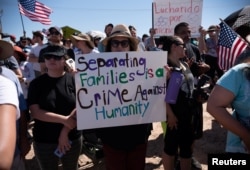The U.N. Children’s Fund has joined the growing chorus of universal outrage at the U.S. immigration policy of separating children from their families who cross the border illegally, calling it harmful to the welfare of children.
UNICEF’s executive director, Henrietta Fore, describes as heartbreaking the situation of children, many of them babies, who are separated from parents seeking safety in the United States.
Speaking for her, UNICEF spokesman Christophe Boulierac says regardless of their migration status, children are children and they have the right to be protected and to be with their families.
“Detention and family separation are traumatic experiences that can leave children more vulnerable to exploitation and abuse, and can create toxic stress which, as multiple studies have shown, can impact children’s long-term development,” Boulierac said.
In April, U.S. Attorney General Jeff Sessions announced a "zero tolerance" policy in which children and parents who cross the U.S. border illegally are separated. That's because the adult is at least temporarily placed in a detention facility, while current law says children have to be placed in the "least restrictive" setting.
Boulierac says there is abundant evidence showing that separating children from their families and putting them into detention can have a terrible impact on their physical and psychological well-being.
“Research shows that children who have not seen a parent for one month after the parent’s arrest experience more frequent changes in sleeping habits, anger, and withdrawing from family compared to children who have seen their parents within a month after arrest,” Boulierac said.
UNICEF's Fore describes the many generous actions taken by the U.S. government to help child refugees, asylum seekers and migrants in Syria, South Sudan, Somalia, Haiti and other countries in crisis.
She urges the current administration to show the same concern in working for the best interest of refugee and migrant children within its own territory.





